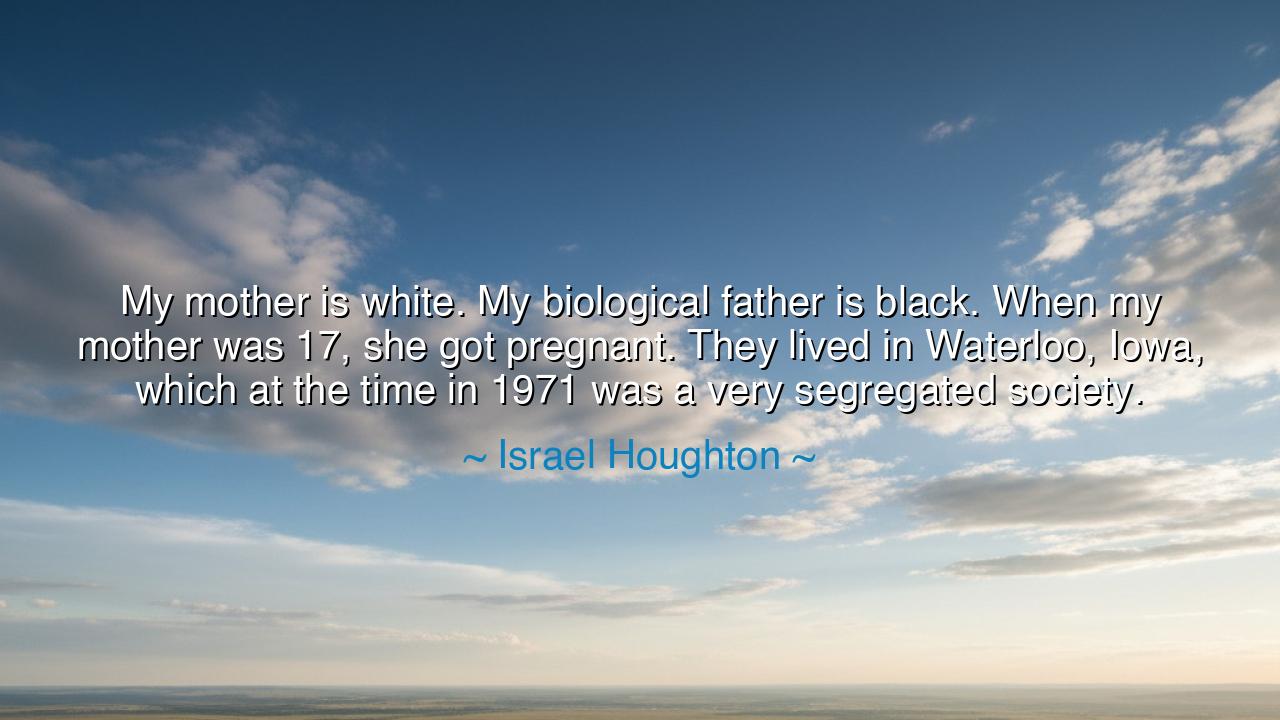
My mother is white. My biological father is black. When my mother
My mother is white. My biological father is black. When my mother was 17, she got pregnant. They lived in Waterloo, Iowa, which at the time in 1971 was a very segregated society.






The singer and servant of faith, Israel Houghton, shared the story of his own beginning with these words: “My mother is white. My biological father is black. When my mother was 17, she got pregnant. They lived in Waterloo, Iowa, which at the time in 1971 was a very segregated society.” Though simple in form, these words carry the weight of generations. They speak of courage in the face of shame, of love in the face of division, of life born into a world still torn by the chains of prejudice.
To say “segregated society” is to name an ancient wound, one that scarred not only Waterloo, Iowa, but the whole of America. It was a time when laws had changed, yet hearts had not. Black and white were taught to stand apart, to mistrust, to despise, to live as strangers though sharing the same soil. In such a world, the union of two races was seen not as a blessing, but as a scandal. A child born of both was judged before he drew his first breath.
Yet in the life of Israel Houghton, we see the enduring truth: that no barrier of man can erase the image of God in His creation. His mother, young and burdened with the weight of judgment, chose to give life. His father, though of another race, was bound to him by blood eternal. And though society condemned, love created what prejudice sought to destroy. His story is not merely personal—it is a parable of all who are born into division, yet rise above it to bring healing through their very existence.
History offers many echoes of this struggle. Think of Loving v. Virginia (1967), just a few years before Israel’s birth, when the Supreme Court of the United States struck down laws forbidding interracial marriage. Richard and Mildred Loving, a white man and a black woman, had dared to marry in defiance of segregation’s cruelty. They, too, bore the scorn of their time. Yet their courage tore down a wall, proving that love can stand where hate commands it to fall. Israel’s life unfolded in the shadow of their triumph, yet still within the weight of cultural division.
The meaning of Houghton’s words is therefore both painful and triumphant. They remind us that segregation is not only a matter of laws but of culture, of whispers, of judgments passed in silence and in stares. They show us that every child born of two worlds carries within them both the wound and the cure—the wound of rejection by society, and the cure of unity that their very blood proclaims. His story is not about music alone; it is about the deeper harmony of life that comes when walls are broken and humanity remembers itself as one.
The lesson for us is clear: we must never allow the sins of prejudice to dictate the worth of a person’s life. The color of one’s parents, the circumstance of one’s birth—these do not define destiny. What defines destiny is the courage to live, the strength to rise, and the refusal to let hatred silence love. Every man and woman, whether born in privilege or in rejection, is capable of becoming a vessel of light, if they embrace the truth that they are more than society’s labels.
Practical wisdom flows: if you see division, resist it. If you hear prejudice, speak against it. Honor the courage of those who bore scorn for daring to love across boundaries, for their sacrifices built the freedom we inherit. And in your own life, do not judge by appearances, but by character, compassion, and truth. For in every child, whether born in shame or in honor, there is a spark of eternity that no society can erase.
So let the words of Israel Houghton echo in your soul: “They lived in Waterloo, Iowa, which at the time in 1971 was a very segregated society.” Remember how far we have come, and how far we still must go. Remember that love is stronger than division, and that those who are born into struggle often rise to teach us what true unity means. For where society builds walls, God creates bridges—and it is upon those bridges that humanity must walk together.






AAdministratorAdministrator
Welcome, honored guests. Please leave a comment, we will respond soon